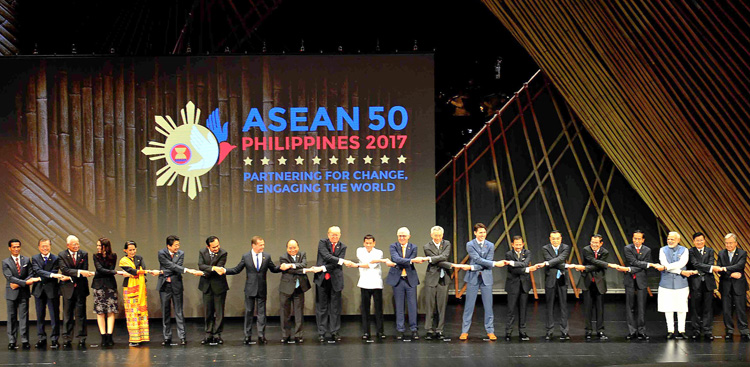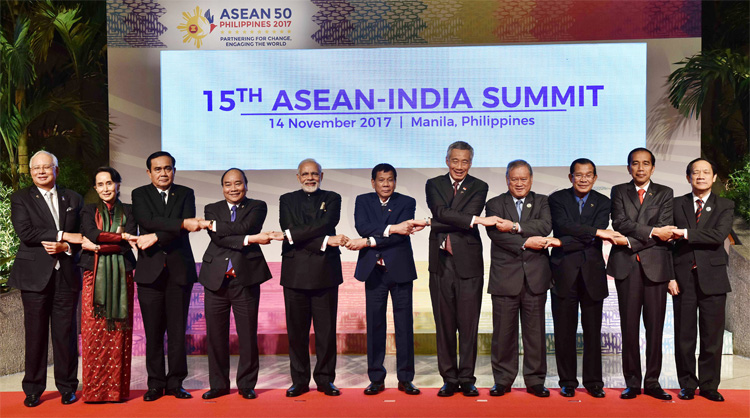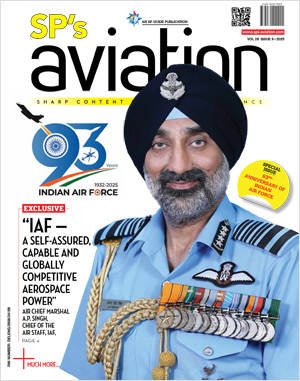INDIAN ARMED FORCES CHIEFS ON OUR RELENTLESS AND FOCUSED PUBLISHING EFFORTS

The insightful articles, inspiring narrations and analytical perspectives presented by the Editorial Team, establish an alluring connect with the reader. My compliments and best wishes to SP Guide Publications.

"Over the past 60 years, the growth of SP Guide Publications has mirrored the rising stature of Indian Navy. Its well-researched and informative magazines on Defence and Aerospace sector have served to shape an educated opinion of our military personnel, policy makers and the public alike. I wish SP's Publication team continued success, fair winds and following seas in all future endeavour!"

Since, its inception in 1964, SP Guide Publications has consistently demonstrated commitment to high-quality journalism in the aerospace and defence sectors, earning a well-deserved reputation as Asia's largest media house in this domain. I wish SP Guide Publications continued success in its pursuit of excellence.
- A leap in Indian aviation: Prime Minister Modi inaugurates Safran's Global MRO Hub in Hyderabad, Calls It a Milestone
- All about HAMMER Smart Precision Guided Weapon in India — “BEL-Safran Collaboration”
- India, Germany deepen defence ties as High Defence Committee charts ambitious plan
- True strategic autonomy will come only when our code is as indigenous as our hardware: Rajnath Singh
- EXCLUSIVE: Manish Kumar Jha speaks with Air Marshal Ashutosh Dixit, Chief of Integrated Defence Staff (CISC) at Headquarters, Integrated Defence Staff (IDS)
- Experts Speak: G20 Summit: A Sign of Global Fracture
India, US, Japan, Australia quadrilateral security dialogue kicks off
 |
By Lt. General P.C. Katoch (Retd) Former Director General of Information Systems, Indian Army |

November 12, 2017 witnessed the first meeting of officials of India, US, Japan and Australia meeting at Manila, giving shape to security cooperation in the Indo-Pacific for keeping the region free and open. This was the ‘Quad’; quadrilateral level talks that the US had been proposing since long. Formation of a quadrilateral security dialogue comprising India, the US, Australia and Japan was first mooted a decade back but it somehow did not materialize. Australian Prime Minister Kevin Rudd had pulled his country out after China, which perceived the Quad as an attempt to counter its rise, and lodged a formal protest with all four countries. In October this year, Japanese Foreign Minister Taro Kono had said that Tokyo favours a dialogue between Japan, the US, India and Australia to further boost strategic partnership among them.
The quadrilateral dialogue is very much warranted as China has demonstrated increased aggressiveness and total disregard to international norms and laws, UNCLOS included. In fact, China’s recent move to establish two Chinese-controlled international maritime courts for providing China’s interpretation of maritime law and legitimizing her its illegal claims in the seas is blatant snub to the United Nations and the international community at large. China has been lying that it has completed its development of reefs and islands, and their militarization in the South China Sea (SCS). In July 2017, China unveiled a massive ship described "magic island maker"; named ‘Tian Kun Hao’, the ship is capable of digging 6,000 cubic m per hour, equivalent of three standard swimming pools. That this would be used both in the Western Pacific and the Indian Ocean is obvious. The ‘Quad’ meeting at Manila was held two days ahead of the ASEAN summit at the same venue, latter also discussing the security challenges facing the India-Pacific region and China’s military expansion in the SCS. Soon after the meeting, India, Australia and Japan issued separate statements listing the India-Pacific as the major area of the deliberations and resolved to expand cooperation to uphold a rules-based order and respect for international law in the strategically important region. While clarifying that the ‘Quad’ was not aimed at any particular country, the MEA said consultations were held on issues of common interest in the India-Pacific region with a focus on cooperation based on converging vision and values for promotion of peace, stability and prosperity in the area, saying, “They agreed that a free, open, prosperous and inclusive India-Pacific region serves the long-term interests of all countries in the region and of the world at large.

The officials also exchanged views on addressing common challenges of terrorism and proliferation linkages impacting the region as well as on enhancing connectivity.” India also highlighted India’s ‘Act East’ policy as the cornerstone of its engagement in the Indo-Pacific region. The Japanese Foreign Ministry stated that officials discussed measures to ensure a free and open international order based on the rule of law in the India-Pacific, adding, “From this perspective, the participants discussed the direction for cooperation, including with countries in the region, in upholding the rules-based order and respect for international law in the Indo-Pacific.” The Australian Foreign Ministry said the four countries shared a vision for increased prosperity and security in the India-Pacific region and will work together to ensure that it “remains free and open”. “The officials examined ways to achieve common goals and address shared challenges in the region. This includes upholding the rules-based order in the Indo-Pacific and respect for international law, freedom of navigation and over-flight, increased connectivity.” US, Australia and Japan emphasized talks on the DPRK nuclear issue but this was missed out in the readout by the MEA. Almost simultaneous to the Quad meeting in Manila, two significant events occurred. One was US and South Korean navies kicking off a four-day joint exercise in the Western Pacific close to North Korea in an unusual strong display of naval might; seven South Korean warships including three destroyers joining three US aircraft carriers - USS Ronald Reagan, USS Nimitz and USS Theodore Roosevelt. It is the first such triple-aircraft carrier drill in the region in a decade.
The second event was the Second Indian Ocean Rim Association (IORA) Meeting of Experts for Maritime Safety and Security, hosted at New Delhi on 7-8 November. Over 150 participants, including 50 experts from IORA Member States and Dialogue Partners, discussed existing Maritime Safety and Security issues in the Indian Ocean region and deliberated upon tangible and feasible solutions to successfully manage these challenges. The topics included: Maritime Safety and Security Challenges in the IOR; Geostrategic Cooperation: An Indian Ocean Architecture; Inclusive Approach to Maritime Domain Awareness; Regional Legal Framework for Maritime Governance; Creating Synergy in Capacity and Capability Building. The concluding session focused on the outcomes and deliverables. The overall outcomes were amalgamated in the “Blueprint for Maritime Safety and Security in IORA”. It goes without saying that the Indo-Pacific is crucial to the prosperity of the region which can be upset by China in her dream to become a ‘Great Power’ any which way. Officially, all ‘Quad’ members deny any link to China and China has said that the Quad should not target them, but it all depends on the actions and behaviour of a hegemonic China; undoubtedly. The Quad certainly has a major role to play in the region.





